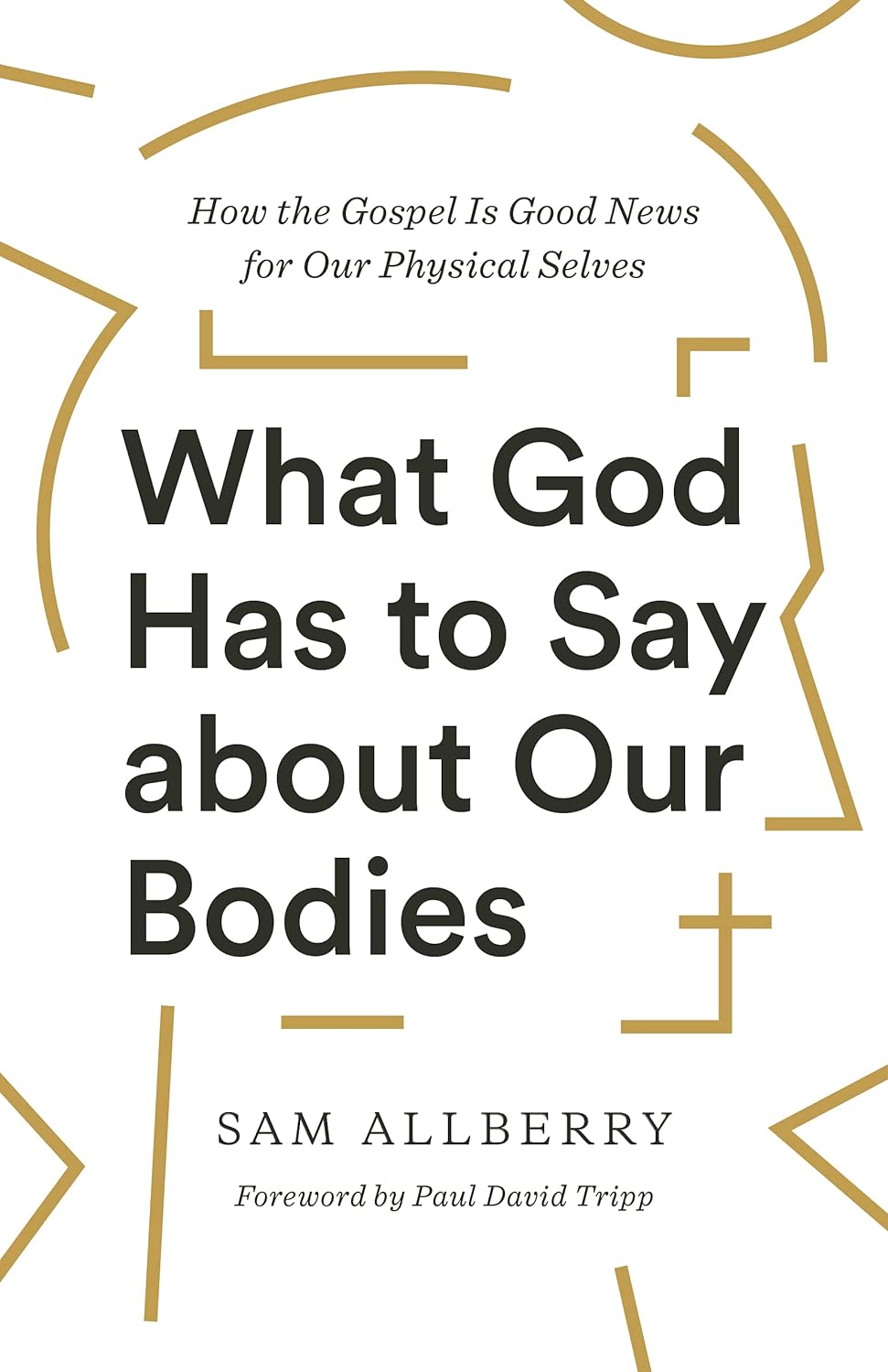I have never ridden a horse. But those who have warn that it is possible to fall from either side. It is much the same with how we think about the human body. We can value it too much and actually obsess over it (idolatry); or we may count it as insignificant and despise it (asceticism). The one dishonours God by worshipping the body while the other dishonours God by despising his good creation. The female executive who is obsessed about her physical appearance is in danger of placing her body in the place of God. Similarly, the devout brother who pays no attention to the quality of his sleep or food might be ignoring a crucial aspect of his stewardship.
The Christian worldview extols the goodness of the human body.
Neither attitude is Christian. And it is in guiding us to avoid both extremes that this book by Sam Allberry is so helpful. We can examine the book’s message as a summary of the Bible’s threefold teaching about our physical bodies.

What God Has to Say about Our Bodies: How the Gospel Is Good News for Our Physical Selves
Sam Allberry
What God Has to Say about Our Bodies: How the Gospel Is Good News for Our Physical Selves
Sam Allberry
In What God Has to Say about Our Bodies, Sam Allberry explains that all of us are fearfully and wonderfully made, and should regard our physicality as a gift. He offers biblical guidance for living, including understanding gender, sexuality, and identity; dealing with aging, illness, and death; and considering the physical future hope that we have in Christ.
In this powerfully written book, you’ll gain a new understanding for the immeasurable value of our bodies and God’s ultimate plan to redeem them.
1. The Body is Good
Unlike many other faiths, the Christian worldview extols the goodness of the human body. By declaring that God purposely formed man from the earth (Genesis 2:7), an act of creation which he also celebrated as “good” (Genesis 1:31). Thus God has put a sign of approval upon our human bodies.
“This is part of what makes Christianity stand out,” writes Allberry. “It has been common among other religious (and nonreligious) belief systems to demean the body, along with our physicality––to see it as something unspiritual or in need of escaping. In contrast, the Bible sees our body as a good (if imperfect) creation of God” (p21).
But God would go further. God himself took on this body and come to earth. In fact, as the author notes, “Jesus’ incarnation is the highest compliment the human body has ever been paid” (p20). We must also recall that at the ascension Jesus didn’t shed his human body. He went up with it. “There is now a human body sitting at the right hand of God the Father at the very centre of heaven” (p21).
So, we shouldn’t seek to escape from the body. Nor should we despise it. Our physical body is also not to be seen as inferior to the more ‘spiritual’ side of us. Genesis teaches us that God began with the physical body and then breathed into this vessel to make it a living creature (Genesis 2:7).
Our physicality is good and should lead us to gratitude and praise.
Also, the distinctions between the sexes, which stems from the creation of humanity (Genesis 1:27), is equally good and worthy (p57). As Allberry further comments, “The interplay of our respective glories enriches all of us. Being male and female is designed to help us be better at being people. It is not just a matter of biology, but of theology; not just about the multiplication of humanity, but the fuller imaging of God” (p68).
Knowing that the body (our physicality) is good should lead us, just like David, to thanksgiving, gratitude, and praise (Psalm 139:13-14).
2. The Body is Fallen
Having seen that the human body is a precious gift from God, we must nevertheless come to terms with another obvious fact. “Our bodies have been fearfully and wonderfully made. But they also cause us pain. Because we live in a created world, our bodies are a gift. But because we live in a fallen world, they might not be the gift we would have wanted. Our bodies are broken” (p88).
We all encounter imperfection in our bodies.
Whether it is in the difficulties of sickness, disease, physical weakness, or the congenital deformities that befall a percentage of human births, we all encounter this imperfection in our bodies. Physical creation, which includes our bodies, simply does not work as it was originally meant to (Romans 8:20–21). “That creation doesn’t work as it was originally intended to, and as we sense it should, is a reminder that we don’t relate to God as we were originally intended to” (p89).
And, as the author points out, all of these (from infirmity to sickness, even the shame we can experience from our bodily appearance) result from humanity’s initial turning away from God. “Our estrangement from God has left us all with a sense of needing to cover up and protect ourselves” (p102). Our bodies keep reflecting its innate brokenness as we age, whether we live to be 70 or 100, until we eventually die. “Death is the climax and ultimate proof of our bodily brokenness” (p118).
Because Jesus experienced every expression of human brokenness, he’s able to relate to us as our High Priest.
Through the gospel, however, we learn that death is also the means by which the brokenness of our physical lives is redeemed—the death of another. Jesus experienced the range of human brokenness in his earthly life, though without the moral corruption (Isaiah 53:3). Allberry quotes Dane Ortlund’s Gentle and Lowly to support this point: “He knows what it is to be thirsty, hungry, despised, rejected, scorned, shamed, embarrassed, abandoned, misunderstood, falsely accused, suffocated, tortured, and killed. He knows what it is to be lonely.”
And as the writer of Hebrews reflects, because he has experienced every expression of human brokenness, Jesus is able to relate with us as our High Priest (Hebrews 4:15-16). Through Jesus’ brokenness, our own brokenness is redeemed. “The only hope for us is the body of Jesus, broken fully and finally for us. And by looking to his broken body we find true hope for our own” (p134).
3. The Body Will Be Transformed
A glorious transformation awaits our bodies. As Allberry reminds his reader: “We often labour under the misunderstanding that the life to come will be some form of nonphysical existence. If we have any image of it, it is of something almost ghostly, floating around as spirits. But the vision the Bible has for us is not wraithlike but physical. And the evidence and template for this physical life to come is the resurrection of Jesus” (p177).
Our expectation is for a new life with renewed physical bodies in a new world.
Our expectation is for a new life with renewed physical bodies in a new world. “Disembodied existence in heaven is not God’s ultimate plan for us; it is physical, resurrection life in the new creation we await” (p179). “The grave may be our destination, but it is not our destiny” (p185).
What would this imply for how we relate to our bodies?
Two Concluding Implications
a. Cherish and Care for Your Body
Our future hope (renewed bodies in a renewed universe) requires us to take care of our bodies now. This body which we currently have is not going away; it will be handed back to us transformed and glorified. Knowing this, would we not handle it now with more dignity? At least, it will imply that we will preserve it through physical exercise. We should also adorn our bodies modestly, or appropriately. Furthermore, we must nourish it through proper food, together with adequate sleep.
b. Offer Your Body as a Living Sacrifice to God
When Paul exhorted the early church to offer up their bodies as living sacrifices (Romans 12:1), he was actually giving a concise theology of the Christian life. For probably no other image better conveys the outworking of the gospel in the believer’s life. As living sacrifices we are dead, though alive; we are sacrifices, yet living. Does this sound oppressive? Not at all. As Allberry notes, “We already know that Jesus is not a cruel taskmaster” (p151).
As living sacrifices we are dead, though alive; we are sacrifices, yet living.
Note Jesus’ words: “Come to me, all who labor and are heavy laden, and I will give you rest. Take my yoke upon you, and learn from me, for I am gentle and lowly in heart, and you will find rest for your souls. For my yoke is easy, and my burden is light” (Matthew 11:28-30). Commenting on this, Allberry writes, “Jesus is the perfect representation of who God is. He is also the perfect realisation of who we’re meant to be” (p152).
While the picture of a sacrifice might make it seem God wants us to merely obey, the image of a temple points out that this God will dwell in us (1 Corinthians 6:19). God dwelling both with and in our bodies is the climax we look forward to (Revelations 21:3). Hallelujah! Nothing else this side of heaven compares with that privilege.














